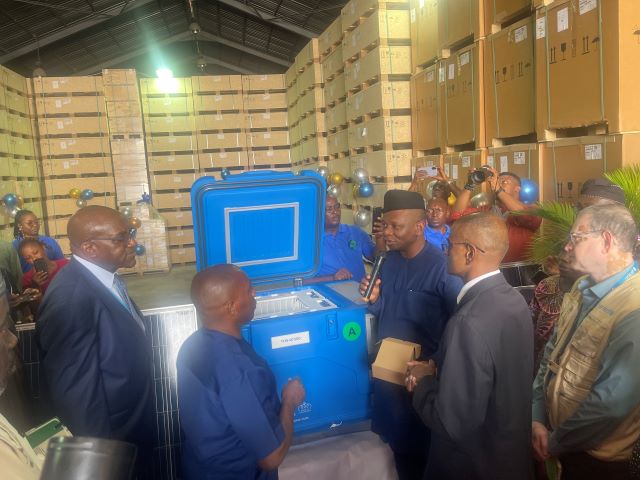
The National Primary Health Care Development Agency (NPHCDA) has received 1,653 solar-powered direct-drive refrigerators from Gavi, the Vaccine Alliance, to strengthen Nigeria’s vaccine storage and distribution system.
Speaking at the official handover in Abuja on Wednesday, the Executive Director of NPHCDA, Dr. Muyi Aina, said the equipment would help close existing gaps in vaccine storage, particularly in underserved areas with high disease burdens.
“This initiative marks another important step in delivering on the health pillar of President Bola Tinubu’s Renewed Hope Agenda, which prioritizes quality primary healthcare services for all Nigerians,” Dr. Aina stated.
According to him, the refrigerators—comprising 1,241 units of the B Medical brand and 412 units of the Plus brand—were carefully selected through a rigorous process to ensure durability and efficiency.
He said, “In addition to these 1,653 units, we are also getting spare parts. One of the things we are very mindful of is that we do not want to procure equipment that will function for only a couple of years and then break down. So, we have 165 packs of spare parts and a 10-year preventive maintenance agreement provided by the vendor supplying this equipment.
“We also have temperature monitoring devices that accompany every single unit. This cold chain equipment will be distributed to states. The first batch of 525 units is already here as we speak. They are in this warehouse right behind us, and I think we should applaud ourselves for that.
“The rest of the 1,653 units have already landed in the country and are being processed. Some are already in trucks on their way, while others are undergoing clearance. But 100% of the devices and parts are already in-country, and we are thankful for that.”
On the distribution of the equipment, Dr. Aina explained: “This will cover all 36 states and the Federal Capital Territory (FCT). The Northwest will receive 448 units, North-Central 308, Northeast 128, Southeast 205, Southwest 343, and South-South 221. In total, 53% of the devices will be deployed in northern states, while 47% will go to the southern region.”
Dr. Aina noted that the timing of the distribution is crucial, as Nigeria prepares for a major integrated immunization campaign in October, targeting over 109 million young people with vaccines against measles, rubella, polio, and other diseases, alongside nutrition interventions.
He expressed appreciation to Gavi, UNICEF, WHO, and other development partners for their continuous support in strengthening Nigeria’s immunization supply chain, adding that the initiative would ensure that vaccines reach even the most remote communities.
“This investment is about saving lives, reducing zero-dose children, and ensuring every Nigerian has access to life-saving vaccines,” Dr. Aina said.
In his remarks, World Health Organisation (WHO), Country Representative, Dr. Alex Gassasira, represented by Deputy Country Representative, Dr. Alex Chimbaru, said the handover of solar direct-drive refrigerators to the NPHCDA marks a pivotal step toward enhancing Nigeria’s immunization infrastructure.
Dr. Chimbaru explained that solar-powered refrigerators will play a vital role in maintaining vaccine potency and safety, especially in remote and energy-challenged communities.
“This initiative aligns very well with WHO’s strategic priorities, particularly those outlined in the Immunization Agenda 2030, which advocates equitable access to vaccines, sustainable cold-chain systems, and integration with primary healthcare.
“By leveraging solar technology, we are ensuring not only the quality and safety of vaccines but also expanding access in underserved off-grid areas. This approach advances environmental sustainability while strengthening health systems resilience.
“With nationwide deployment of these SDD refrigerators, we anticipate substantial improvements in routine immunization coverage, reduced vaccine wastage, better protection against vaccine-preventable disease outbreaks, and enhanced service delivery at the last mile. This contributes to our goal of achieving universal health coverage and protecting our children, reflecting our shared commitment to leaving no one behind and ensuring vaccine equity and health justice,” he said.
Also speaking, UNICEF Chief of Health, Dr. Maharajan Muthu, said the handover ceremony is a testament to the power of partnership and collaboration, adding that cold chain infrastructure is the backbone of an effective immunization program, ensuring that vaccines and other temperature-sensitive medical supplies retain their potency from storage to administration.
Muthu highlighted UNICEF’s role in supporting the NPHCDA in strengthening cold chain systems by providing technical support in analytics, identifying cold chain needs, procurement, and delivery of state-of-the-art equipment.
He said, “The handover includes 1,653 solar direct-drive refrigerators, 165 sets of spare parts, temperature monitoring devices, and 30-day temperature recorders, valued at approximately $11 million.
“This investment will significantly enhance Nigeria’s healthcare infrastructure, enabling outreach to remote communities and ensuring that safe and effective vaccines reach every child, leaving no one behind.”
Muthu, however, noted that while the supplies address key challenges related to cold chain equipment, there are still gaps such as asset registration and tracking, regular maintenance, vaccine and logistics stock tracking, and sustainable financing solutions.
“UNICEF remains committed to working alongside the federal government of Nigeria to overcome these challenges. We will continue to strengthen the immunization supply chain, support community engagement, and advocate for sustainable financing to ensure every child receives life-saving vaccines,” he added.